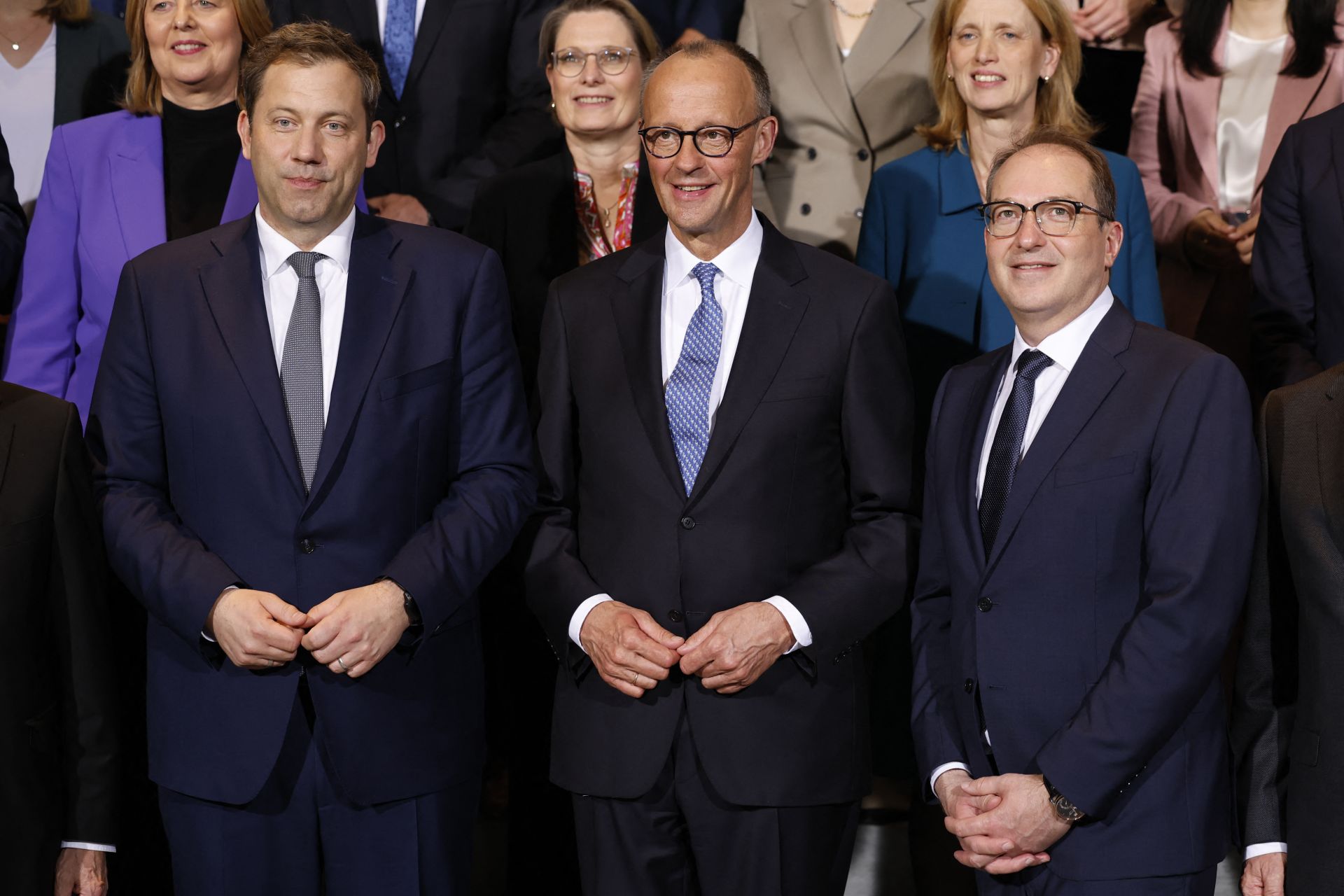- Home
- Middle East
- After Bumpy Start, 'European Chancellor' Merz Visits Paris, Warsaw

Newly elected German Chancellor Friedrich Merz (C) poses for a group photo with German Finance Minister and Vice Chancellor Lars Klingbeil (R) and German Interior Minister Alexander Dobrindt after the first meeting of the new cabinet at the Chancellery in Berlin on May 6, 2025. ©Odd ANDERSEN / AFP
After a difficult start, Germany's new Chancellor Friedrich Merz will visit France and Poland on Wednesday, on a mission to boost ties with the European neighbours in turbulent times.
Amid transatlantic turbulence caused by US President Donald Trump's trade tariffs and doubts over his security commitment to Europe, the European Union has sought a strengthened political and defense posture and Merz vowed on taking office Tuesday to be "a very European chancellor".
On the need to support Ukraine, Merz said he would "consult intensively" with France and Britain, adding that "if we can include the Poles, then it will be even better".
Merz -- whose conservative CDU/CSU won Germany's February elections -- is a committed European, transatlanticist and Ukraine supporter who has vowed to restore Germany's role on the world stage after half a year of paralysis.
But the launch of his coalition government got off to a bad start when he failed to win an initial parliament vote, only securing the post in the second round.
For several tense hours, the drama threatened to prolong the political crisis that has hobbled Germany since the coalition of centre-left chancellor Olaf Scholz collapsed in November.
Claire Demesmay from Berlin's Centre Marc Bloch research institute told AFP that, Merz, who had previously been "in a position of strength... has been weakened" already by not getting parliament support at the first time of asking.
However French President Emmanuel Macron was one of the first foreign leaders to congratulate Merz when he finally made it, saying he hoped they could "make the Franco-German motor stronger than ever".
"It is up to us to accelerate our European agenda for sovereignty, security and competitiveness. For the French, for the Germans and for all Europeans," he wrote on X.
United on Ukraine
A first visit to France is customary for German chancellors, but Merz has assigned it special importance.
He has underlined the need to jumpstart Franco-German ties at the core of the EU which was seen to have stalled under Scholz of the Social Democrats (SPD).
Merz said in January that, if elected, he would seek to "repair relations with our most important neighbours in Europe, Poland and France".
Merz is more open than Scholz to sending German long-range missiles to Ukraine, and of eventually deploying German troops as part of a peacekeeping force if a ceasefire is agreed.
Even before taking office, Merz's alliance achieved a softening of Germany's domestic debt brake to enable an investment "bazooka", much of it to boost Germany's armed forces.
On Tuesday Merz said his government's number one challenge would be to preserve "peace and freedom".
Ukrainian President Volodymyr Zelensky wrote on X that "we sincerely hope that Germany will grow even stronger and that we'll see more German leadership in European and transatlantic affairs".
Merz later said that "President Zelensky knows he can rely on me and on Germany".
Shadow of WWII
In the coalition contract between Merz's CDU/CSU alliance and the SPD, special emphasis is given to "strengthening friendship" with France and Poland.
The document says the three countries should "align closely on all relevant parts of European policy so that we can act in the most united way possible for the benefit of the whole EU".
In Merz's team, "the will to work closely with these two countries is clearly there", said Martin Koopmann, director of the Genshagen foundation.
But Koopmann also pointed to the complexities of the three-way relationship and the fact that Poland is not a eurozone member.
Relations with Poland have been strained by questions of historical responsibility for the crimes of Nazi Germany in the Second World War, which ended 80 years ago this week.
The nationalist Law and Justice (PiS) party, currently in opposition, has long demanded reparations from Berlin.
Less than two weeks before the first round of Poland's presidential elections, Prime Minister Donald Tusk will have to tread carefully in dealing with Merz at the risk of accusations that he is too close to Berlin.
By Céline LE PRIOUX/AFP
Read more


Comments